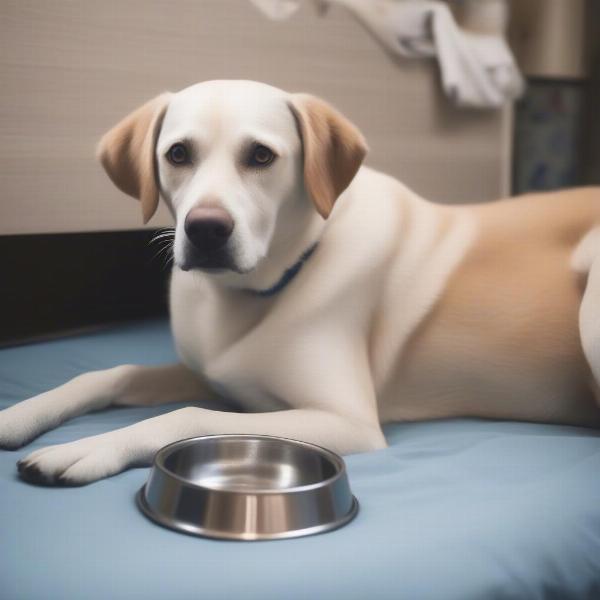Dog diarrhea after anesthesia is a relatively common occurrence. While it can be alarming, it’s often temporary and resolves on its own. Understanding the potential causes, treatment options, and when to seek veterinary attention can help ease your concerns and ensure your furry friend recovers comfortably. This article will guide you through everything you need to know about managing dog diarrhea post-anesthesia.
Why Does Anesthesia Cause Diarrhea in Dogs?
Several factors can contribute to dog diarrhea following anesthesia:
- Medications: Certain anesthetic drugs can affect the gastrointestinal tract, slowing down motility and leading to diarrhea.
- Stress: The stress of surgery and the unfamiliar environment can disrupt a dog’s digestive system.
- Changes in Diet: Fasting before surgery and the introduction of new foods post-op can upset the stomach.
- Underlying Conditions: Pre-existing digestive issues can be exacerbated by anesthesia.
- Antibiotics: If your dog is prescribed antibiotics after surgery, these can also contribute to diarrhea.
 Dog experiencing diarrhea due to medication side effects after anesthesia
Dog experiencing diarrhea due to medication side effects after anesthesia
Managing Diarrhea at Home
In many cases, mild diarrhea after anesthesia can be managed at home. Here are some tips:
- Bland Diet: Offer your dog a bland diet of boiled chicken and rice or a commercially available prescription diet for sensitive stomachs.
- Plenty of Water: Ensure your dog has access to fresh water to prevent dehydration.
- Probiotics: Probiotics can help restore the balance of good bacteria in the gut. Consult your veterinarian for recommendations.
- Monitor Consistency and Frequency: Keep a close eye on your dog’s stool. Note the frequency and consistency of the diarrhea.
When to Seek Veterinary Attention
While mild, short-lived diarrhea is often not a cause for concern, there are situations when you should contact your veterinarian immediately:
- Bloody Diarrhea: Blood in the stool can indicate a more serious issue.
- Lethargy and Weakness: If your dog is unusually lethargic or weak, it could be a sign of dehydration or other complications.
- Vomiting: Vomiting accompanied by diarrhea can lead to severe dehydration.
- Prolonged Diarrhea: If the diarrhea persists for more than 24-48 hours despite home care, consult your veterinarian.
- Loss of Appetite: A complete loss of appetite can be a sign of an underlying problem.
Dr. Emily Carter, DVM, emphasizes, “It’s always better to err on the side of caution. If you’re concerned about your dog’s diarrhea after anesthesia, don’t hesitate to contact your veterinarian. They can assess the situation and recommend the best course of action.”
Preventing Diarrhea Post-Anesthesia
While not all cases of diarrhea are preventable, here are some steps you can take to minimize the risk:
- Pre-operative Bloodwork: Pre-operative bloodwork can help identify any underlying health issues that might contribute to digestive problems.
- Inform Your Veterinarian: Make sure your veterinarian is aware of any previous digestive issues your dog has experienced.
- Gradual Reintroduction of Food: After surgery, gradually reintroduce your dog’s regular food to avoid upsetting their stomach.
- dog whining after sedation Sometimes related to post-operative discomfort which can exacerbate stress and digestive issues.
- dog whines after anesthesia Learn more about the reasons behind whining after anesthesia and how to address it.
Dr. James Miller, a board-certified veterinary surgeon, adds, “Communicating effectively with your veterinarian is crucial. Be sure to discuss any concerns you have about your dog’s health before and after surgery.”
Conclusion
Dog diarrhea after anesthesia is a common side effect that often resolves on its own with proper home care. However, monitoring your dog’s symptoms and seeking veterinary attention when necessary is vital for ensuring a smooth and healthy recovery. By understanding the causes, treatment options, and warning signs, you can help your furry friend navigate this post-operative challenge and return to their normal, playful self. Remember to consult your veterinarian if you have any concerns about your dog’s health.
FAQ
- How long does diarrhea after anesthesia typically last in dogs? Diarrhea usually resolves within 24-48 hours.
- What can I feed my dog if they have diarrhea after anesthesia? A bland diet of boiled chicken and rice is often recommended.
- Should I give my dog medication for diarrhea after anesthesia? Do not give your dog any medication without consulting your veterinarian.
- Can stress cause diarrhea in dogs after anesthesia? Yes, the stress of surgery and the unfamiliar environment can disrupt a dog’s digestive system.
- Is bloody diarrhea after anesthesia a cause for concern? Yes, bloody diarrhea should be addressed by a veterinarian immediately.
- When should I contact my veterinarian about my dog’s diarrhea after anesthesia? Contact your veterinarian if the diarrhea is severe, bloody, prolonged, or accompanied by other symptoms like vomiting or lethargy.
- How can I prevent my dog from getting diarrhea after anesthesia? Inform your veterinarian about any prior digestive issues, and ensure a gradual reintroduction to food after surgery.
ILM Dog is your trusted resource for expert advice on dog care, encompassing breed selection, health, training, nutrition, grooming, and more. We provide practical, evidence-based information to support dog owners worldwide. Whether you’re a seasoned owner or just starting your journey with a furry companion, we offer valuable insights to help you provide the best possible care. From understanding dog whimpering after spaying to surgery on dogs intestinal blockage and even female dog desexing recovery time, ILM Dog is here to help. Connect with us for personalized guidance and support: [email protected] or +44 20-3965-8624.